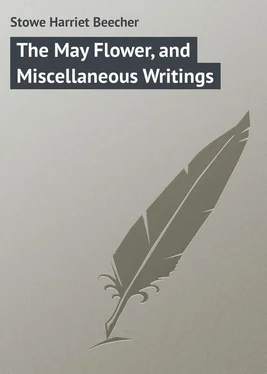Harriet Stowe - The May Flower, and Miscellaneous Writings
Здесь есть возможность читать онлайн «Harriet Stowe - The May Flower, and Miscellaneous Writings» — ознакомительный отрывок электронной книги совершенно бесплатно, а после прочтения отрывка купить полную версию. В некоторых случаях можно слушать аудио, скачать через торрент в формате fb2 и присутствует краткое содержание. Жанр: foreign_prose, на английском языке. Описание произведения, (предисловие) а так же отзывы посетителей доступны на портале библиотеки ЛибКат.
- Название:The May Flower, and Miscellaneous Writings
- Автор:
- Жанр:
- Год:неизвестен
- ISBN:нет данных
- Рейтинг книги:4 / 5. Голосов: 1
-
Избранное:Добавить в избранное
- Отзывы:
-
Ваша оценка:
- 80
- 1
- 2
- 3
- 4
- 5
The May Flower, and Miscellaneous Writings: краткое содержание, описание и аннотация
Предлагаем к чтению аннотацию, описание, краткое содержание или предисловие (зависит от того, что написал сам автор книги «The May Flower, and Miscellaneous Writings»). Если вы не нашли необходимую информацию о книге — напишите в комментариях, мы постараемся отыскать её.
The May Flower, and Miscellaneous Writings — читать онлайн ознакомительный отрывок
Ниже представлен текст книги, разбитый по страницам. Система сохранения места последней прочитанной страницы, позволяет с удобством читать онлайн бесплатно книгу «The May Flower, and Miscellaneous Writings», без необходимости каждый раз заново искать на чём Вы остановились. Поставьте закладку, и сможете в любой момент перейти на страницу, на которой закончили чтение.
Интервал:
Закладка:
There was a great contrast between these two deacons in their services and prayers, when, as was often the case, the absence of the pastor devolved on them the burden of conducting the duties of the sanctuary. That God was great and good, and that we all were sinners, were truths that seemed to have melted into the heart of Deacon Enos, so that his very soul and spirit were bowed down with them. With Deacon Abrams it was an undisputed fact , which he had settled long ago, and concerning which he felt that there could be no reasonable doubt, and his bustling way of dealing with the matter seemed to say that he knew that and a great many things besides.
Deacon Enos was known far and near as a very proverb for peacefulness of demeanor and unbounded charitableness in covering and excusing the faults of others. As long as there was any doubt in a case of alleged evil doing, Deacon Enos guessed "the man did not mean any harm, after all;" and when transgression became too barefaced for this excuse, he always guessed "it wa'n't best to say much about it; nobody could tell what they might be left to."
Some incidents in his life will show more clearly these traits. A certain shrewd landholder, by the name of Jones, who was not well reported of in the matter of honesty, sold to Deacon Enos a valuable lot of land, and received the money for it; but, under various pretences, deferred giving the deed. Soon after, he died; and, to the deacon's amazement, the deed was nowhere to be found, while this very lot of land was left by will to one of his daughters.
The deacon said "it was very extraor'nary: he always knew that Seth Jones was considerably sharp about money, but he did not think he would do such a right up-and-down wicked thing." So the old man repaired to 'Squire Abel to state the case, and see if there was any redress. "I kinder hate to tell of it," said he; "but, 'Squire Abel, you know Mr. Jones was – was — what he was , even if he is dead and gone!" This was the nearest approach the old gentleman could make to specifying a heavy charge against the dead. On being told that the case admitted of no redress, Deacon Enos comforted himself with half soliloquizing, "Well, at any rate, the land has gone to those two girls, poor lone critters – I hope it will do them some good. There is Silence – we won't say much about her; but Sukey is a nice, pretty girl." And so the old man departed, leaving it as his opinion that, since the matter could not be mended, it was just as well not to say any thing about it.
Now, the two girls here mentioned (to wit, Silence and Sukey) were the eldest and the youngest of a numerous, family, the offspring of three wives of Seth Jones, of whom these two were the sole survivors. The elder, Silence, was a tall, strong, black-eyed, hard-featured woman, verging upon forty, with a good, loud, resolute voice, and what the Irishman would call "a dacent notion of using it." Why she was called Silence was a standing problem to the neighborhood; for she had more faculty and inclination for making a noise than any person in the whole township. Miss Silence was one of those persons who have no disposition to yield any of their own rights. She marched up to all controverted matters, faced down all opposition, held her way lustily and with good courage, making men, women, and children turn out for her, as they would for a mail stage. So evident was her innate determination to be free and independent, that, though she was the daughter of a rich man, and well portioned, only one swain was ever heard of who ventured to solicit her hand in marriage; and he was sent off with the assurance that, if he ever showed his face about the house again, she would set the dogs on him.
But Susan Jones was as different from her sister as the little graceful convolvulus from the great rough stick that supports it. At the time of which we speak she was just eighteen; a modest, slender, blushing girl, as timid and shrinking as her sister was bold and hardy. Indeed, the education of poor Susan had cost Miss Silence much painstaking and trouble, and, after all, she said "the girl would make a fool of herself; she never could teach her to be up and down with people, as she was."
When the report came to Miss Silence's ears that Deacon Enos considered himself as aggrieved by her father's will, she held forth upon the subject with great strength of courage and of lungs. "Deacon Enos might be in better business than in trying to cheat orphans out of their rights – she hoped he would go to law about it, and see what good he would get by it – a pretty church member and deacon, to be sure! getting up such a story about her poor father, dead and gone!"
"But, Silence," said Susan, "Deacon Enos is a good man: I do not think he means to injure any one; there must be some mistake about it."
"Susan, you are a little fool, as I have always told you," replied Silence; "you would be cheated out of your eye teeth if you had not me to take care of you."
But subsequent events brought the affairs of these two damsels in closer connection with those of Deacon Enos, as we shall proceed to show.
It happened that the next door neighbor of Deacon Enos was a certain old farmer, whose crabbedness of demeanor had procured for him the name of Uncle Jaw . This agreeable surname accorded very well with the general characteristics both of the person and manner of its possessor. He was tall and hard-favored, with an expression of countenance much resembling a north-east rain storm – a drizzling, settled sulkiness, that seemed to defy all prospect of clearing off, and to take comfort in its own disagreeableness. His voice seemed to have taken lessons of his face, in such admirable keeping was its sawing, deliberate growl with the pleasing physiognomy before indicated. By nature he was endowed with one of those active, acute, hair-splitting minds, which can raise forty questions for dispute on any point of the compass; and had he been an educated man, he might have proved as clever a metaphysician as ever threw dust in the eyes of succeeding generations. But being deprived of these advantages, he nevertheless exerted himself to quite as useful a purpose in puzzling and mystifying whomsoever came in his way. But his activity particularly exercised itself in the line of the law, as it was his meat, and drink, and daily meditation, either to find something to go to law about, or to go law about something he had found. There was always some question about an old rail fence that used to run "a leetle more to the left hand," or that was built up "a leetle more to the right hand," and so cut off a strip of his " medder land ," or else there was some outrage of Peter Somebody's turkeys getting into his mowing, or Squire Moses's geese were to be shut up in the town pound, or something equally important kept him busy from year's end to year's end. Now, as a matter of private amusement, this might have answered very well; but then Uncle Jaw was not satisfied to fight his own battles, but must needs go from house to house, narrating the whole length and breadth of the case, with all the says he's and says I's , and the I tell'd him's and he tell'd me's , which do either accompany or flow therefrom. Moreover, he had such a marvellous facility of finding out matters to quarrel about, and of letting every one else know where they, too, could muster a quarrel, that he generally succeeded in keeping the whole neighborhood by the ears.
And as good Deacon Enos assumed the office of peace-maker for the village, Uncle Jaw's efficiency rendered it no sinecure. The deacon always followed the steps of Uncle Jaw, smoothing, hushing up, and putting matters aright with an assiduity that was truly wonderful.
Читать дальшеИнтервал:
Закладка:
Похожие книги на «The May Flower, and Miscellaneous Writings»
Представляем Вашему вниманию похожие книги на «The May Flower, and Miscellaneous Writings» списком для выбора. Мы отобрали схожую по названию и смыслу литературу в надежде предоставить читателям больше вариантов отыскать новые, интересные, ещё непрочитанные произведения.
Обсуждение, отзывы о книге «The May Flower, and Miscellaneous Writings» и просто собственные мнения читателей. Оставьте ваши комментарии, напишите, что Вы думаете о произведении, его смысле или главных героях. Укажите что конкретно понравилось, а что нет, и почему Вы так считаете.












